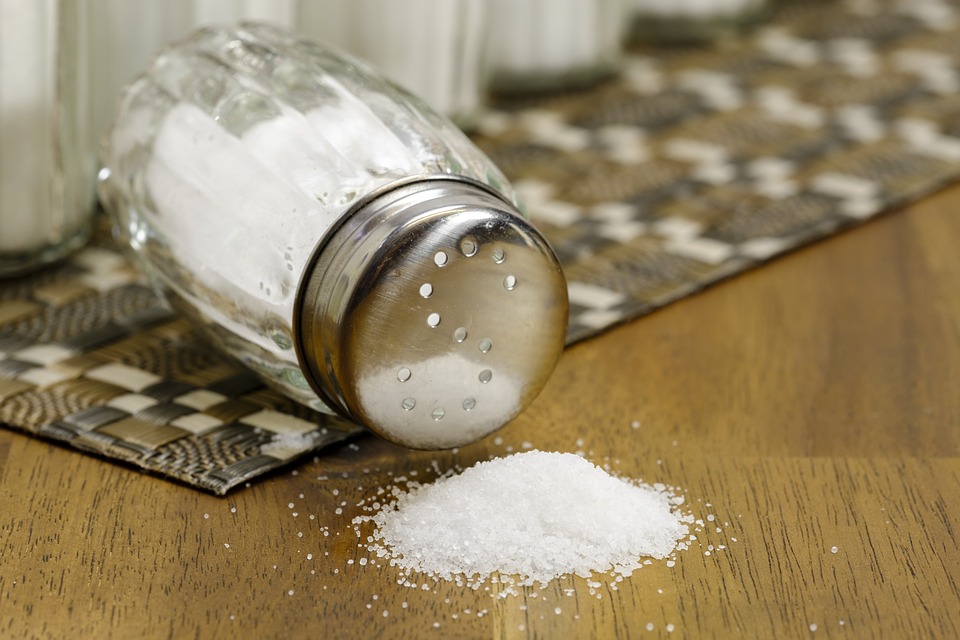
Sodium is a naturally occurring, essential mineral that helps regulate body fluids and kidney function. Of concern to many is the fact that high doses can cause hypertension, kidney damage, and decrease of calcium absorption. It can cause bloating, fatigue and increase your risk for strokes and heart disease.
The Right Nutritional Value
The recommended daily intake of sodium is 2,300 mg per day. A low sodium diet is considered between 400 – 1000 mg a day. A normal sodium diet is considered between 1500 – 2,300 per day, and a high sodium diet between 2,500 and 4,000 mg per day. The average American diet contains over 3,500 mg per day, according to the U.S. Center for Disease Control. Experts agree that damage of high sodium accumulates and can have a long term, life threatening effect.
Even those of us who think we are eating well and are careful about our food choices, may not realize how much sodium is lurking in our foods. Processed, canned, jarred and frozen foods have high levels of sodium, as do most restaurant prepared meals and certainly "fast foods" where sodium and flavor enhancers are added for taste and texture.
Few of us realize that foods we eat every day are loaded with sodium. In considering the examples below, it becomes clear that, once again, the best foods to eat are fresh and unprocessed, which not only contains more nutrients, but contains much less sodium.
High Sodium Foods To Avoid
> One cup of cocoa has 950 mg of sodium.
> A chicken fillet sandwich has 940 mg of sodium.
> Tomato ketchup has 1042 mg.
> Parmesan cheese contains 1862 mg.
> Processed cheese has 1189 mg.
The list goes on. The more processed the food, the more likely it is to contain high sodium levels. On the other hand, Fresh fish, fruits, nuts, eggs, beans, meats and vegetables have low levels of sodium.
Lower Sodium Whole Foods To Enjoy
Fish (fresh)
> Anchovy – 87 mg (3 oz portion)
> Bass – 58 mg.
> Catfish – 51 mg.
 > Clams – 31 mg.
> Clams – 31 mg.
> Cod – 59 mg.
> Flounder – 66 mg.
> Lobster – 179 mg.
> Oysters – 62 mg.
> Salmon (Atlantic) – 63 mg.
> Scallops – 217 mg.
> Shrimp – 119 mg.
> Sole – 66 mg.
> Trout (rainbow) – 69 mg.
> Tuna (albacore) – 34 mg.
Fruits (fresh)
> Apple 1 medium – 0 mg.
> Apricots, 1 medium – negligible
> Asian pear – 0 mg.
> Avocados, 1/2 medium – 10 mg.
> Bananas, 1 medium – 1 mg.
> Blackberries – 0 mg.
> Blueberries, 1/2 cup – 4 mg.
> Cantaloupe, 1/8 of melon – 5 mg.
> Cherries, sweet – 0 mg.
> Cranberries, 1 cup – 1 mg.
> Grapefruit – 9 mg.
> Grapes, 1 cup – 2 mg.
> Oranges – 0 mg.
> Peaches – 0 mg.
> Pears – 0 mg.
> Pineapples, chopped, 1 cup – 2 mg.
> Plums – 0 mg.
> Raspberries – 0 mg.
> Strawberries, 1/2 cup – 1 mg.
> Tomatoes – 4 mg.
> Watermelon, cubed, 1 cup – 3 mg.
> Egg, whole, medium, 1 – 55 mg.
Meats and Poultry (3 oz raw, unprocessed)
> Beef
> Liver – 62 mg.
> Porterhouse – 47 mg.
> Sirloin – 44 mg.
> Chicken breast – 58 mg.
> Duck (meat only) – 64 mg.
> Turkey breast – 51 mg.
Nuts, unsalted (1/4 cup)
> Almonds, raw – 4 mg.
> Brazil nuts, raw – 1 mg.
> Cashews, dry roasted – 6
> Hazelnuts, raw – 1 mg.
> Macadamia, dry roasted – 2 mg.
> Peanuts, dry roasted – 6 mg.
> Pecans, raw – negligible mg.
> Pistachio, dry roasted – 2 mg.
> Walnuts, raw – negligible mg.
Beans (1/2 cup cooked)
> Lentils – 13 mg.
> Kidney Beans – 2 mg.
> Lima beans – 3 mg.
> Navy beans – 1 mg.
> Split peas – 12 mg.
Vegetables, fresh (1/2 cup raw)
> Acorn squash – 2 mg.
> Alfalfa sprouts – 1 mg.
> Artichoke – 1 medium, steamed – 79 mg.
> Asparagus – 1 mg.
> Beans, green – 3 mg.
> Beets – 49 mg.
> Bell peppers – 2 mg.
> Broccoli – 12 mg.
> Brussels sprouts – 11 mg.
> Butternut squash – 3 mg.
> Cabbage – 14 mg.
> Carrots – 20 mg.
> Cauliflower – 8 mg.
> Corn – 12 mg.
> Cucumbers – 1 mg.
> Eggplant – 2 mg.
> Lettuce – 2 mg.
> Mushrooms – 1 mg.
> Onions – 2 mg.
> Potatoes, medium, baked – 16 mg.
> Pumpkins – 1 mg.
> Spaghetti squash – 9 mg.
> Spinach – 22 mg.
> Sweet potatoes – 9 mg.
> Tomatoes – 4 mg.
> Watercress – 7 mg.
> Yams – 7 mg.
> Zucchini – 1 mg.
For more whole health discussions like this, listen to my weekly radio show Living Above The Drama available on iHeartRadio.



 Available everywhere and promising instant energy, energy drinks have grown in popularity over the last decade. They allow us to get more done faster, but at what costs? The largest population they are pitched to is the “under 30” group. This includes high school and college students as well as athletes, both school age and professional.
Available everywhere and promising instant energy, energy drinks have grown in popularity over the last decade. They allow us to get more done faster, but at what costs? The largest population they are pitched to is the “under 30” group. This includes high school and college students as well as athletes, both school age and professional.

 > Clams – 31 mg.
> Clams – 31 mg.



